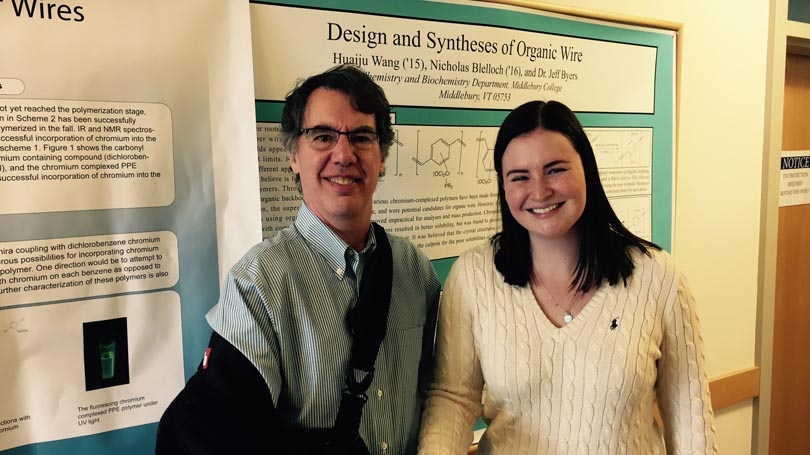
Sarah Gibbons (chemistry PhD candidate) was hosted by Dr. Jeff Byers (PhD Chemistry ’84), a faculty member at Middlebury College on her recent externship.
The GRAD Office Externship Program, or “take a grad student to work day,” gives active graduate students an opportunity to shadow a Dartmouth graduate alumni and live a day in the life at their occupation. In late February, I had the pleasure of observing Dr. Jeff Byers (PhD Chemistry ’84), a faculty member at Middlebury College.
Driving up to Middlebury on a clear February morning, I appreciated the gorgeous mountain views of northern Vermont, which were nearly eclipsed by Middlebury’s beautiful campus. A primarily undergraduate institution with thriving academics, athletics, and undergraduate research programs, Middlebury is the total package for someone interested in teaching. After a brief introduction and a coffee, we were on our way to Byers’ first and only class of the day – organic chemistry.
I was instantly intrigued by this class, because unlike many chemistry classes taught in the lecture style, this class was taught as a flip class; the students watched a pre-recorded lecture at home, then came to class ready to work through problems and learn the material actively with their professor. As someone who took organic chemistry in the lecture style and thought it worked well, I was curious about how the students felt in the flipped classroom.
While the students worked in small groups on their activity for the day (learning how to assign structures using IR spectroscopy), I wandered around the room and listened as they worked through the problems out loud and explained their rationale to each other. When the work seemed to wind down, I stopped by a group and asked how they liked the flipped classroom. One student replied, “Well, I was really skeptical at first… but I’ve actually enjoyed learning this way.” The consensus was that everyone enjoyed the flipped style; students were not shy about coming up to the board and sharing their answers, with Byers guiding them in the right direction on tough questions.
Watching the flipped classroom was valuable for me, having never experienced a class taught that way, but it was only the start of a steady stream of great advice for the rest of the day. While touring the undergraduate research labs, we talked about setting yourself up for success as a young professor, including applying for funding and how to get materials or equipment that you need in order to get research done.
We also talked about negotiating for lab space and design, and how it’s important to do that as you’re arriving at an institution. As we walked through the organic chemistry teaching labs, Byers explained to me that the layout that most schools now use, a more open-concept lab where the instructor can see all of the students, was first introduced at Middlebury, and for a long time that was how the design when described to architects.
In addition to the more serious topics, Byers reminisced about his time at Dartmouth, talking about his first year living in the Tuck dorms, and doing intramural sports with the “Men of Steele” (the Department of Chemistry used to be located in Steele Hall), as well as the serendipitous way that he became a faculty member at Middlebury.
Spending the day at Middlebury College gave me an idea of what it would be like to have the dream job of teaching and having a research group of undergraduates. It was a wonderful opportunity and I strongly recommend it to anyone who is unsure of what they’d like to do after graduation. There are many successful Dartmouth graduate alumni in different fields, who have a wealth of knowledge available for graduate students getting ready to enter the working world.